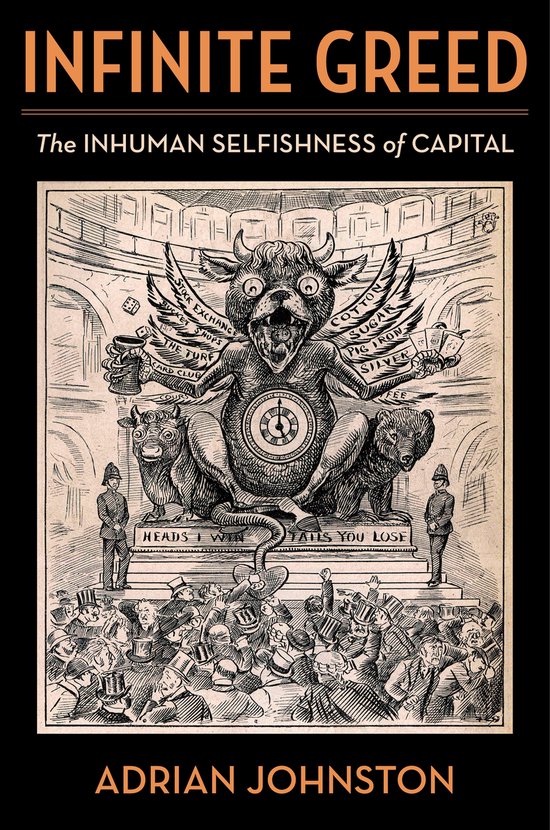
Insurrections: Critical Studies in Religion, Politics, and Culture- Infinite Greed
Through a novel synthesis of Marxism and psychoanalysis, Adrian Johnston reveals how the relentless pursuit of profits is not fundamentally animated by human acquisitiveness.
Selfishness is essential to capitalism—or so both advocates and opponents claim. In Infinite Greed, Adrian Johnston argues that this consensus is mistaken. Through a novel synthesis of Marxism and psychoanalysis, he reveals how the relentless pursuit of profits is not fundamentally animated by human acquisitiveness. Instead, capitalism’s strange “infinite greed” demands that individuals sacrifice their pleasures, their well-being, and even themselves to serve inhuman capital.
Johnston traces the mechanisms that compel capitalist subjects to obey the cold imperative to accumulate in perpetuity and without limits—and also without regard for the consequences for everyone and everything else. Facing crises such as spiraling wealth inequality and the profit-driven prospect of a looming ecological apocalypse, the rational self-interest of the majority would seem to dictate putting a stop to capitalist accumulation. By bringing together the Marxian critique of political economy with psychoanalytic metapsychology, Johnston shows why and how capitalism, rather than being responsive to people’s rationally selfish interests, disregards and overrides them instead.
Unlike previous syntheses of Marxism and psychoanalysis, Infinite Greed pairs Freudian and Lacanian concepts with the economic heart of Marx’s historical materialism. In so doing, Johnston brings to light the complex intertwining of political and libidinal economies keeping us invested and complicit in perpetuating capitalism and its ills.
Selfishness is essential to capitalism—or so both advocates and opponents claim. In Infinite Greed, Adrian Johnston argues that this consensus is mistaken. Through a novel synthesis of Marxism and psychoanalysis, he reveals how the relentless pursuit of profits is not fundamentally animated by human acquisitiveness. Instead, capitalism’s strange “infinite greed” demands that individuals sacrifice their pleasures, their well-being, and even themselves to serve inhuman capital.
Johnston traces the mechanisms that compel capitalist subjects to obey the cold imperative to accumulate in perpetuity and without limits—and also without regard for the consequences for everyone and everything else. Facing crises such as spiraling wealth inequality and the profit-driven prospect of a looming ecological apocalypse, the rational self-interest of the majority would seem to dictate putting a stop to capitalist accumulation. By bringing together the Marxian critique of political economy with psychoanalytic metapsychology, Johnston shows why and how capitalism, rather than being responsive to people’s rationally selfish interests, disregards and overrides them instead.
Unlike previous syntheses of Marxism and psychoanalysis, Infinite Greed pairs Freudian and Lacanian concepts with the economic heart of Marx’s historical materialism. In so doing, Johnston brings to light the complex intertwining of political and libidinal economies keeping us invested and complicit in perpetuating capitalism and its ills.
| Auteur | | Adrian Johnston |
| Taal | | Engels |
| Type | | Paperback |
| Categorie | | Economie & Financiën |